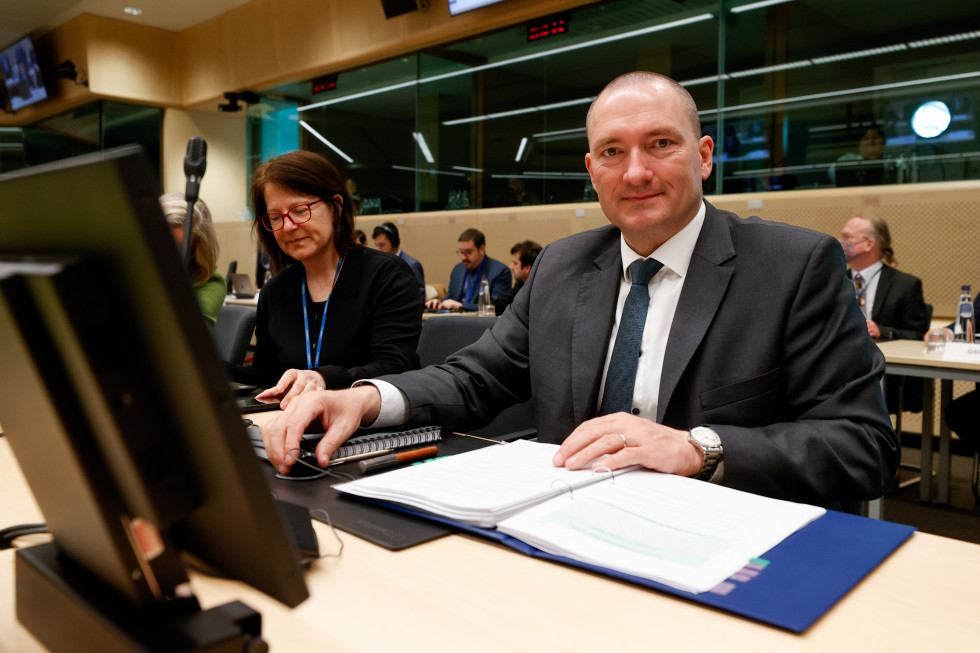By: UKOM
Minister Jože Podgoršek attended the Agriculture and Fisheries Council in Brussels. The discussion centred on the information provided by the European Commission and the exchange of views on the situation in agricultural markets in light of the war in Ukraine. Ministers also held a video conference with the Ukrainian minister of agriculture Roman Leshchenko, who presented the situation in Ukraine. Ministers held an important discussion on the strategic plans of the common agricultural policy (CAP). Slovenia provided information on seeking alternatives to plant protection products in agricultural and non-agricultural land, in particular as regards glyphosate. Ministers also discussed the issue of large carnivores.
EU’s agriculture ministers devoted a large part of today’s session to the situation in agricultural markets in light of the war in Ukraine. Member states exchanged their views on the situation and measures presented by the European Commission. Ministers were addressed by the Ukrainian minister of agriculture Roman Leshchenko. Minister Jože Podgoršek stressed in the discussion that Slovenia regularly monitors the situation in agricultural markets and expressed concerns about the rising prices of inputs, in particular energy products, feed and fertilisers. He stressed the importance of adjusting the rules for the implementation of the CAP. “We support the temporary adjustment of the rules for the implementation of the CAP, such as the use of ecological focus areas and fallow land for the production of food and feed, as well as the use of plant protection products in these areas where such products are normally prohibited.” According to the minister, the European Commission is preparing some measures in light of the war in Ukraine, such as providing support for private storage of pig meat, advances of direct payments and more flexible thresholds for plant protection products in case of import from third countries. “It is also preparing some financial measures, since it will deploy EUR 500 million for emergency measures for farmers, who are the most affected in this crisis. In this context, Slovenia will receive EUR 1.7 million. We are also preparing a framework of state aid as a result of the Ukraine crisis, which will include agriculture by granting compensation for the rising prices of energy products, fertilisers and seeds.”
The information on the process of approving the CAP strategic plans, which was provided by the European Commission, was one of the most important topics in the Council. The European Commission will submit its formal comments to member states by the end of March. Minister Podgoršek stressed that it is vital that the European Commission approves the strategic plans as quickly as possible to ensure the stability of agriculture. “Farmers have to take decisions for planning their production; it is therefore vital to confirm the orientations that they helped to shape in the framework of drafting the strategic plan.” He added that Slovenia will work towards the possibility of adjusting the CAP strategic plans also in light of the impacts that the war has on agricultural markets. He suggested that the Commission should examine the need to revise the targets of the Green Deal in light of the situation in Ukraine. As regards the drafting of strategic plans, Hungary presented a joint declaration from the session of the Visegrad Group, which was supported also by Slovenia. The declaration stresses the ambitions of the proposed strategic plans of the participating countries and the contribution of the CAP to achieving the goals of the European Green Deal.
Ministers also discussed an efficient management of large carnivores. Minister Podgoršek presented the measures for the management of large carnivores in Slovenia and highlighted the good cooperation with Croatia in monitoring large carnivores. He suggested the introduction of a similar system at the EU level. “Member states should harmonise the methods for monitoring large carnivores and enable regular and active management of large carnivores in countries with a favourable conservation status.”
The AOB items included the Slovenian initiative on seeking alternatives to the use of glyphosate. Minister Podgoršek stressed the need for a common solution. “Researchers from various countries work towards finding alternatives to chemical weed control in railways; however, the use of herbicides remains the most efficient from economic and safety reasons. The decisions to further reduce the use of chemical plant protection products have to take into account the availability of alternative methods to chemical plant protection. It is important to invest in the development of these methods.”
In relation to AOB items, Spain with the support of Slovenia presented possible measures for the fisheries sector in light of the rising fuel prices. Austria provided information on the joint call for enhancing the potential of plant-based proteins in Europe, which was also supported by Slovenia. Poland presented the joint response to the proposal for a regulation on sustainable use of pesticides. The joint non-paper, which draws attention to the difficulties in implementing the new proposal for a regulation, is supported also by Slovenia. Slovenia expresses deep concern about some of the European Commission’s proposals. It supports the general goal of reducing the use of plant protection products and stresses that it has always been committed to achieving this goal with appropriate implementation and incentives at the national level.

